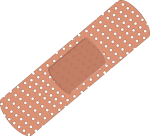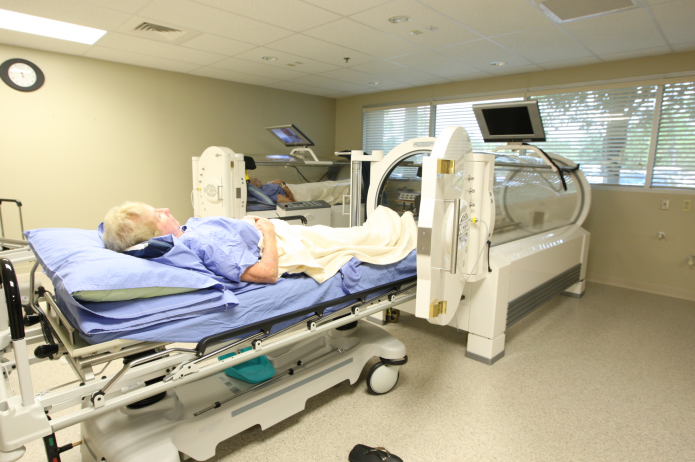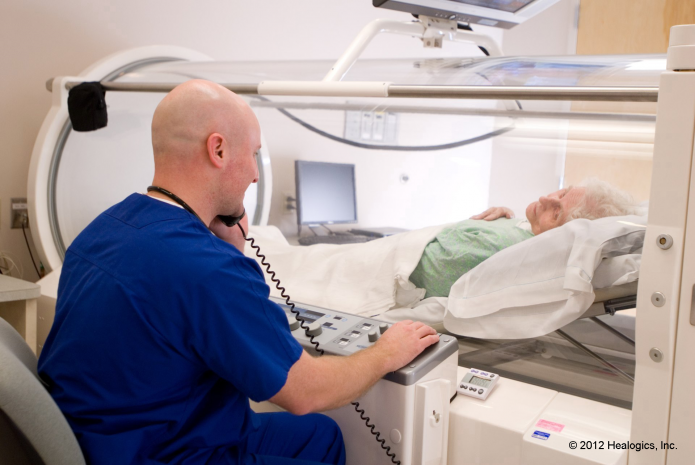One of a mom’s primary jobs, beginning as soon as our babies start to crawl and toddle around, is to kiss and fix “the boo-boo.” Most of us have seen our share of scrapes, cuts and, sometimes, more serious wounds after accidents, sports injuries, etc. When the wound goes beyond what a simple cleaning and bandage can do, parents need to know what the options are for wounds that don’t heal well on their own with routine home care.
Most of us have seen our share of scrapes, cuts and, sometimes, more serious wounds after accidents, sports injuries, etc. When the wound goes beyond what a simple cleaning and bandage can do, parents need to know what the options are for wounds that don’t heal well on their own with routine home care.
Many of you might not be aware that Northwest Arkansas actually does have a center that specializes in wound care — the Mercy Wound Care & Hyperbaric Center. If your child (or possibly your parent or grandparent) has a wound that concerns you because it’s not healing well, you can get a referral from your primary doctor to see a wound care specialist. We interviewed the Center’s Medical Director, Dr. Douglas Friesen, as well as Amy Egger, a Wound Care Center Consultant, for more information about what moms need to know about caring for wounds.
By Dr. Douglas Friesen, Medical Director, and Amy Egger, Wound Care Center Consultant of the Mercy Wound Care & Hyperbaric Center
What are the most commonly seen injuries or conditions that the specialists at the Wound Care Center treat?
The most common wounds we treat at our Advanced Wound Care Center are diabetic foot ulcers and pressure ulcers. These wounds are often complicated by other underlying conditions making them more difficult to heal without treatment.
What are some of the most common reasons why some wounds have trouble healing in a timely way?
Chronic wounds are often complicated by a variety of underlying conditions. Patients with diabetes, vascular disease, arterial disease, prolonged pressure or neuropathy are more at risk to develop a chronic wound.
 What are some of the signs that a patient (or caregiver) should ask to be referred to a Wound Care specialist?
What are some of the signs that a patient (or caregiver) should ask to be referred to a Wound Care specialist?
Infections can delay healing and spread to other parts of the body. Warning signs include increased pain at the wound site, redness or swelling spreading away from the wound, a foul wound odor, change in color or amount of drainage from the wound or if you experience fever, chills, nausea or vomiting.
What are some of the new techniques or therapies that Wound Care specialists use to treat difficult-to-heal wounds?
Hyperbaric oxygen therapy (HBOT) is something we get really excited about. It’s high pressure oxygen that improves blood vessel to the wound. It causes the blood vessels to dilate to improve blood flow and it helps to heal infection in the local tissue. In addition to HBO treatment, our Center utilizes other advanced techniques such as biological skin substitutes and weekly debridements.
What are hyperbaric chambers and how are they used to help heal wounds?
Hyperbaric Oxygen Therapy (HBOT) is a medical treatment used to treat chronic wounds. The treatment takes place in a transparent acrylic chamber. The chamber contains 100 percent oxygen at a pressure greater than atmospheric pressure (sea level). HBOT increases the blood’s ability to carry oxygen to wound tissue. In addition, white blood cell activity is enhanced. HBOT also accelerates the formation of blood vessels at the wound site. HBOT is approved by Medicare to treat patients with a variety of medical conditions.
For moms who are also helping to care for their aging parents, what do they need to know about wound care for the elderly? Are there “red flags” to watch out for?
 People with chronic wounds often have other underlying conditions such as diabetes, peripheral arterial disease, vascular disease or radiation injuries. As our loved ones get older, they are more likely to develop one or more of these conditions and managing them properly helps the body heal wounds faster.
People with chronic wounds often have other underlying conditions such as diabetes, peripheral arterial disease, vascular disease or radiation injuries. As our loved ones get older, they are more likely to develop one or more of these conditions and managing them properly helps the body heal wounds faster.
Physical changes in the skin as we age can reduce our ability to sense touch and pressure. In addition, conditions such as diabetes may cause nerve damage which can impair sensation of feeling and failing eyesight can make it difficult to detect changes in the skin. Inspect your loved ones’ skin and feet for reddened skin that gets worse over time, blisters or open sores.
As we age our skin produce less oil resulting in dry, itchy skin. It’s important to use lotions and moisturizers to keep skin moist and more ready to heal.
Pressure ulcers, more commonly known as bed sores, occur when an area of skin under constant pressure breaks down. Risk factors include being older, having limited mobility, having a condition that inhibits blood flow and malnourishment. Pressure ulcers typically form on skin close to bones such as in areas around the elbows, heels, hips, ankles, shoulders, back and back of the head. Do not massage the area around a pressure ulcer since it can tear the skin and break fragile blood vessels.
If a patient, parent or caregiver feels that she needs to see a Wound Care specialist, what is the process for requesting an appointment?
Wounds that are present for more than 30 days have a lower chance of healing on their own. Ideally, we would like to begin treatment prior to 30 days to improve the healing rate of the wound. If you believe your loved one should be treated at our advanced wound care center, you may contact their Primary Care Physician (PCP) and ask for a referral. If you have any questions regarding a referral to Mercy Wound Care and Hyperbaric Center, call us at (479) 878-2550.
Our thanks to Dr. Douglas Friesen and Amy Egger of the Mercy Wound Care & Hyperbaric Center for taking the time to answer our questions. For more information about the Center’s services, call them at 479-878-2550 or visit the Mercy Wound Care Center website by clicking here.



